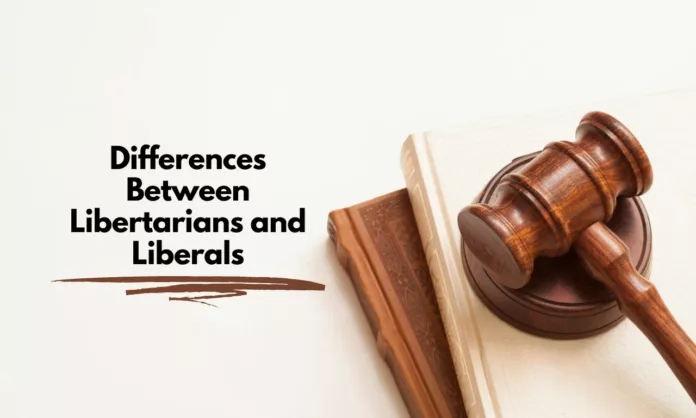Libertarians and liberals are two distinct political ideologies with some similarities, but also some significant differences.
Here are a few key differences between Libertarians vs Liberals:
- Views on individual liberty and government intervention: Libertarians prioritize individual liberty and believe that government should have a minimal role in both the economy and society. They argue that individuals should be free to make their own choices without interference from the government, as long as they do not harm others. Liberals also support individual liberty, but they believe that government has a responsibility to ensure that all individuals have equal access to opportunities and resources. They may support government intervention in the economy and society to promote social justice and equality.
- Economic policies: Libertarians tend to support free-market capitalism and limited government intervention in the economy. They advocate for reduced taxes, decreased regulation, and privatization of government services. Liberals, on the other hand, tend to support government intervention in the economy to ensure that all individuals have equal access to opportunities and resources. They may support progressive taxation, government-funded social programs, and regulation of businesses.
- Social policies: Both libertarians and liberals tend to be socially liberal and support individual rights and freedoms. Libertarians typically advocate for the legalization of drugs, same-sex marriage, and other personal freedoms. Liberals tend to support social policies that promote equality and justice, such as affirmative action, reproductive rights, and LGBT rights.
- Views on the role of government: Libertarians believe that the government should have a minimal role in society and the economy, and that individuals and the private sector should be free to make their own decisions. Liberals believe that the government has a responsibility to address social and economic inequality and promote social justice, and that government intervention is necessary to achieve these goals.
In summary, libertarians and liberals have different views on individual liberty, economic policies, social policies, and the role of government in society.
Table of Contents
Are Libertarians the same as Liberals?
No, libertarians and liberals are not the same. While both ideologies support individual freedom and autonomy, they differ significantly in their core beliefs and policy positions.
Libertarians prioritize individual liberty and limited government intervention in both the economy and society. They believe that people should have the freedom to make their own choices and decisions, as long as they do not harm others. Libertarians tend to be fiscally conservative, advocating for lower taxes, reduced government spending, and free-market capitalism. They are also socially liberal, supporting individual freedom and autonomy on issues such as drug legalization, same-sex marriage, and abortion.
Liberals, on the other hand, prioritize equality and social justice, and believe that government has a responsibility to promote these values. They support a strong welfare state that provides a safety net for the poor and vulnerable, and believe that government intervention is necessary to address social and economic inequality. Liberals tend to support progressive taxation, regulations on businesses, and government-funded social programs. They are also socially liberal, supporting individual rights and freedoms on issues such as LGBT rights and reproductive rights.
While there may be some overlap in their positions on certain issues, libertarians and liberals have fundamentally different approaches to governance and the role of government in society.
What is Opposite of Libertarian?
The opposite of libertarian is authoritarian.
While libertarians advocate for individual liberty and limited government intervention in both the economy and society, authoritarians prioritize government control and authority over individuals and society. Authoritarians tend to support strict government regulation and control of both the economy and personal behavior, and may advocate for limitations on individual freedom in order to maintain social order and stability.
Authoritarian governments may employ tactics such as censorship, surveillance, and repression of political opposition in order to maintain their grip on power. In contrast, libertarianism values individual autonomy and personal freedom, and opposes excessive government intervention and control.
Conclusion
In conclusion, while libertarians and liberals share some similarities in their support of individual freedom and autonomy, they have distinct differences in their core beliefs and policy positions. Libertarians prioritize individual liberty and limited government intervention, while liberals prioritize equality and social justice and believe that government has a responsibility to promote these values. These differences manifest in their views on economic policies, social policies, and the role of government in society. Understanding these differences is important in evaluating political ideologies and making informed decisions about political issues and candidates.

